Review for Magi The Labyrinth of Magic - Season 1 Part 1
Introduction
It’s easy to disparage Kazé. Regular readers of my reviews might come to think that I make a sport of it, but Kazé make it so easy to criticise them. They may have the Facebook and Twitter accounts, but haven’t used them in over a year. It seems they refuse to engage with UK fans altogether, probably thinking of us as a minority market appended to their main audience in France and Germany. As a result, they don’t listen to feedback, and consequently the same authoring errors and flubs have kept cropping up on their Blu-rays and DVDs since their first releases of Professor Layton and Vampire Knight. Add to that the constant delays, the ironic undersupply to the UK audience (try finding Code Geass Blu-rays now!), and the utter failure of their Anime on Demand streaming venture, and you might begin to ask just what the point of Kazé is in the UK anime market. Then they go and do something like this, release Magi: The Labyrinth of Magic on Blu-ray and the point becomes obvious.
Magi is the highly popular re-imagining of the Arabian Nights legend for an anime audience, crafting a new story around familiar characters and settings. Created by A1 Pictures, Magi: The Labyrinth of Magic was one of the few series streamed to the UK through Anime on Demand, while this winter, the sequel series, Magi: The Kingdom of Magic is currently streaming via Animax. This is one show where you’ll have to settle in for the long haul when it comes to collecting, as at the moment it’s a 52-ish episode proposition at least, although the way the story is unfolding, there’s no reason why it won’t run for the full 1001 nights.
Here’s the thing. In the US, Magi: The Labyrinth of Magic was dubbed for online streaming on Neon Alley by Viz Entertainment, but licensed for home video release by Aniplex USA. It’s got the deluxe packaging, bonus postcards and art book, and it’s DVD only. Apparently it’s one of those shows that got an HD holdback from Japan to avoid reverse importation from another Region A country. In Australia, which may be Region B, Madman Entertainment too chose to release the show on DVD only. But in the UK, Viz subsidiary Kazé is releasing it, they’ve already released it in Europe, and they’ve done so on Blu-ray. That’s Region B Blu-ray which isn’t such a hassle for the Japanese companies when it comes to reverse importation. Long story short, the UK is the only English speaking territory in the world which at this time can watch Magi: The Labyrinth of Magic on Blu-ray. And this show simply has to be seen in high definition. I told you there was a point to Kazé!
Magi (pronounced Mah-Gee not May-Jye in this anime) is set in an alternate history of sorcery and magic, where kings are chosen, not just born to power. The ones who do the choosing are the rare embodiments of magic in this world, the Magi, and those chosen must battle through mysterious towering dungeons to gain artefacts of magic and power to earn the right to rule. Aladdin is a young boy who knows he’s a Magi, but know precious little else about himself, other than an instinctive appreciation for all things bosom-y in life. In a desert-bound town that hosts a dungeon, he encounters Alibaba, a hard working ambitious young man who dreams of conquering a dungeon, but who has trained himself to choose expediency over doing the right thing, despite his natural instincts. They also meet a young slave girl named Morgiana, who is shackled more by the chains in her mind than those on her legs. Circumstances lead them into the dungeon, and set them forth on an adventure that will change all of their lives.
The first thirteen episodes of Magi are presented across two Blu-ray discs thus...
Disc 1
1. Aladdin and Alibaba
2. Dungeon Suite
3. Sorcerer of Creation
4. People of the Plains
5. Dungeon-Capturer
6. Fanalis, The Warrior Tribe
7. His Name is Sinbad
8. A Promise That Can’t Be Kept
Disc 2
9. A Prince’s Responsibility
10. His Name is Judar
11. A New Visitor
12. Decisions and Farewells
13. A Prince in Revolt
Picture
Magi: The Labyrinth of Magic gets a 1.78:1 widescreen 1080p transfer on these Blu-ray discs. With 8 episodes on one dual layer disc, and 5 on a single layer platter, and not much in the way of extra features, there’s little issue with compression and the like to contend with, and the anime comes across with detail, clarity and rich colour. There isn’t even much evidence of digital banding, which makes this one of the better HD anime releases. That’s all for the good, as Magi is a show which really excels in the world design, basking in the Middle East setting, rich in architecture, ambience and style, and you can bet that there’s a lot of faux Arabic calligraphy, plenty of Persian rugs, and lots of rich detail to make you glad that you’re watching this in High Definition and not pesky DVD.
The same can’t be said for the character designs though, which underneath their Arab robes, fezzes and turbans wind up as pretty generic for anime characters, although the djinns are impressive. When I first watched the show online my initial concern was for these characters’ teeth. There’s something weird about how their mouths are animated, which makes me think that their dentures are coming loose. The same was true for this home video viewing.
The images used in this review are kindly supplied by the PR and aren’t necessarily representative of the final retail release.
Sound
You have the choice between PCM 2.0 Stereo English and Japanese (and if you select the other menu when you insert the disc, 2.0 French), all encoded at 2.3 Mb per second. I went with the Japanese audio and was pretty happy with the experience, the actors seemed well suited to their roles, the show’s action sequences came across well, and the music was a key part in selling the Middle Eastern atmosphere and the setting, although following a significant initial impact in the opening episodes, there was a slow generic creep to the music that made it seem blander as the series progressed. The subtitles flow well and are easy to read, free of typos and accurately timed. A couple of issues might be that the theme songs aren’t translated, while single word or short sentence translations might flash by a little too quickly to read. They really need to linger on screen for longer than it takes the character to speak in those instances. There is a signs only track, but for this series, that amounts to translating the episode title and not much else. Note that if you watch the Japanese version, and someone happens to be speaking during the episode title screen, then the episode title will also just flash by (missed completely on episodes 11 and 12), and you might need the pause button to read it. As per usual for Kazé discs, the subtitles and audio permutations are locked away from user access, although thankfully for Blu-ray, you do have the pop-up menu to let you change the audio during playback.
I gave the English dub a try, after all having seen the series once in Japanese when it was streamed, the dub would be a selling point for this release. Just as I have done with Tiger & Bunny and Blue Exorcist, I was planning to devote an equal amount of time to the dub, as well as the Japanese audio, but alas just one episode was sufficient to turn me off the idea. The English dub for Magi is a massive missed opportunity. Viz should really have put the time in to commission a script and gather performances that make the most of the setting and style of the story, a modern day version of those 50s Arabian Nights adventure movies, the Sinbad features, making use of the circumlocutions of dialogue, the elaborate phrasing that people associated with the Middle East once upon a time. Instead, what we have here is just another production line anime dub, and not a very good one at that, bearing more resemblance to Sentai’s dubbing efforts. The Japanese dialogue sounds more authentic in that regard.
Extras
Insert the discs, and you have the choice between English and French menu screens. On both discs choose the French menu, and you get trailers for Garden of Words, and Buddha: The Great Departure. With the English menu you get HD trailers for Bakuman and Penguindrum, DVD only releases in the UK.
Then the animated menu loads up, and the clunky interface offers you audio options, episode select, play all, while the only extras are on disc 1, and amount to the textless credit sequences, presented with player locked romanji subtitles rendering them less than textless.
Conclusion
For three episodes, you might be forgiven for thinking that this show is the best thing since the proverbial loaf first got sliced. For the first three episodes, Magi presents a show that is unlike any other anime, a world that is rich, colourful and vibrant, and a story that grabs the attention. It also presents you with characters that engage, are interesting, and you want to see them grow and develop. And then along comes episode four and Magi flushes it all down the toilet, presenting the first of its many issues, with storytelling, character development, and consistency, that will continue to plague it during its run, and which afflict the series even today, as it comes to the end of its second series. What might have been one of the best anime shows in years, winds up as just another average, forgettable exercise in storytelling, sporadically fun to watch, but other than its quality visuals, will never be a show to hold up as particularly noteworthy or special.
Those first three episodes though. They come like a breath of fresh air in anime, a show that tells a story rarely told, what appears to be an adaptation of the Arabian Nights, although as the story unfolds, it turns out that Magi merely lifts some character names and settings and goes in its own, completely original direction. We have the desert setting, the evocative music, the costumes, the architecture, the street life, the feudal societies, the camels... And into it enters Aladdin, a boy with a destiny, but to confuse matters, amnesia into the bargain as well, though the opening scene of the first episode hints at a grand set up to the character. He is a Magi, a being of power, a source of magic whose destiny it is to choose kings. Only he’s a young boy with a breast fetish, and an insatiable appetite. He meets Alibaba, a young man working for a merchant in the market, loading caravans. Alibaba dreams of greater things, but is hamstrung by his past, and his own selfish nature. Together they will climb the dungeon and gain the power to change the world. They’re not the only ones to crave power, as the local Lord Jamil, a merciless slave owner also wants a king’s destiny, and he’ll spend whatever lives are necessary to obtain his ambition, including Alibaba and Aladdin, and his own slave girl Morgiana, daughter of the Fanalis warrior tribe. The first three episodes recount these characters’ first meetings, and how they change each other’s lives, with Aladdin awakening Alibaba’s true humanitarian nature, and the two of them then freeing Morgiana from slavery as they go on to conquer the dungeon. It’s a great start to a series, and it promises much.
Except by episode 4, the dungeon has vanished and the three split up, spread to the winds. You don’t get the character development and interaction that would have cemented an affection for these characters, you instead get two episodes of Aladdin in an Eastern country, where he encounters a nomadic tribe and becomes part of their family. This is to introduce the Kou Empire, who are expanding westwards and are targeting the tribe as their next conquest. Aladdin helps them come to terms with the invaders and prevents a war, before starting on his way back to meet up with Alibaba once more.
Six months later, a convenient caption tells us, and we get an episode of Morgiana, who has been travelling south to find her homeland, and who’s been hitching a ride with a merchant caravan. On her way to Balbadd, she’s run into some slavers, and her emancipated soul can’t let that crime pass without giving them a good kicking. Incidentally, watching Morgiana give her enemies a good kicking is a key selling point to Magi, as she can apparently vary the mass of her feet at will, suddenly imbuing them with the net tonnage that allows them to crush stone underfoot. One of the high points of this collection is seeing her kick her way through a giant monkey! After she’s defeated the slavers, one of their merchandise turns out to be Aladdin, who’s been working his way to Balbadd in search of Alibaba, and got picked up by the slavers when he collapsed of hunger. Together they continue their journey to Balbadd, where on the way they meet a naked Sinbad.
In this story Sinbad is a king who after conquering the seven seas, and various dungeons gained enough power to establish a country of his own. He was going to Balbadd to discuss a certain trade blockade against his nation of Sindria, when he got drunk and bandits stole his property and his clothes. When they get to Balbadd, they find a nation in turmoil, the people hating their king, and the mysterious Fog Troop doing the country the service of a Robin Hood, stealing from the rich and feeding the poor. It turns out that the Fog Troop is being led by Alibaba and his childhood friend Cassim. So, Aladdin and Morgiana who knew Alibaba for a few hours six months ago as they conquered a dungeon, are convinced that Alibaba can’t be a bad guy, and stick up for him even as the Fog Troop continues to commit crimes. That’s one example of Magi’s storytelling that just doesn’t bear much scrutiny. Of course it turns out to be correct in a way, as while Alibaba’s heart is in the right place, his friend Cassim is a bad apple. Also, this is where we learn that Alibaba is the third prince of Balbadd, and not just an ambitious wastrel. He’s going up against his older half-brother Ahbmad, who in his quest for riches and power, has sold out his country to the Kou Empire, got it further into debt, and is about to sell off his populace as slaves to service that debt. Cue more serious butt-kicking from Morgiana. Into the mix, randomly appearing is another Magi named Judar, who is evil for the sake of being evil, a Kou princess who falls in love with Sinbad, a mysterious sponsor for the Fog Troop, a wily banker funding Ahbmad, and it’s clear that this is a show rich with characters, ideas, and storytelling potential.
It just doesn’t handle it at all well. Some ideas are interesting, and are slowly developed through the show, the idea of the source of magic being visible to magic users, this universe’s version of the Force, called Rukh which magic users convert into Magoi to fuel their spells. But at other times it just picks up an idea, toys with it for a while, and then forgets it for ages, and by the time the show calls back to it, you’ll have long since stopped caring. Aladdin’s amnesia? Never really a big issue in this show... It’s the same with the show’s pacing, irregular to say the least, dwelling on inconsequence for ages, and then zipping past the meaningful stuff in the blink of an eye. It also has the annoying habit of keeping the main characters separate, so they rarely interact, and any character development winds up feeling contrived and unnatural. It’s a tangible problem in The Labyrinth of Magic, but the second series, The Kingdom of Magic currently streaming is wholly structured in this way.
Magi: The Labyrinth of Magic is fun to watch, while you are watching it. Weird character teeth aside, it is one of the better animated shows to come from Japan, while the Arabian Nights setting offers a world that you rarely see in anime. It’s just that when the end credits roll, you’re left with a slight sour taste in the mouth, and the realisation that this is a show that squanders its potential with poor storytelling, and non-existent character development. This could have been one of the best anime shows in years; instead it’s just one of the many.
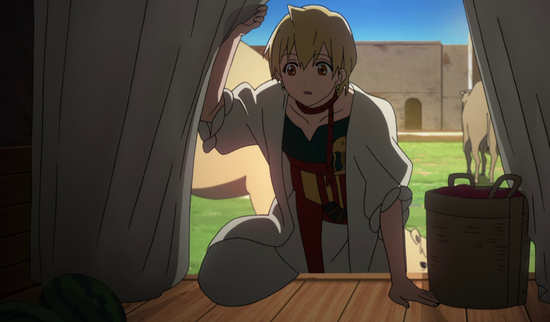


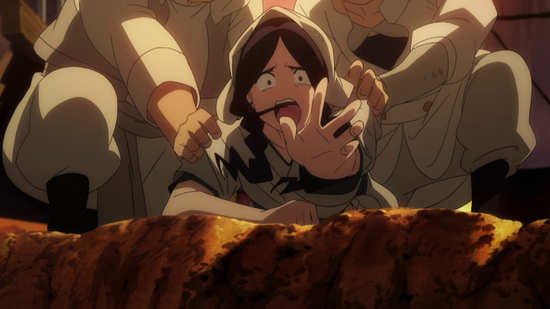
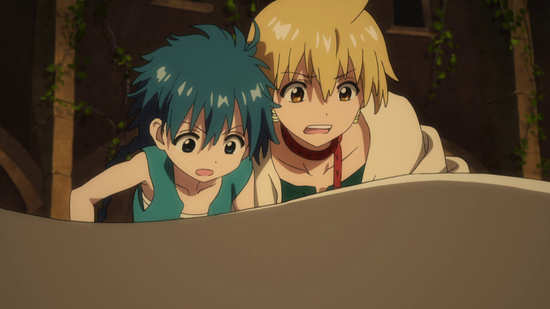
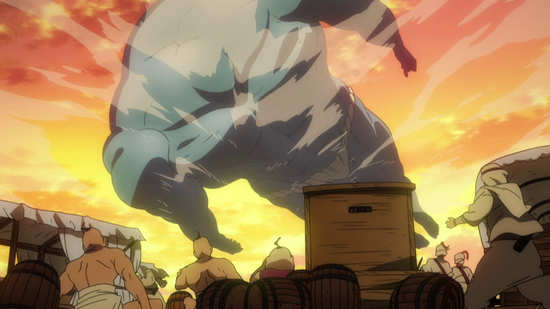
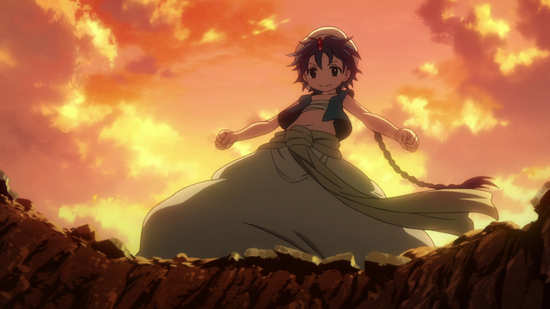
Your Opinions and Comments
Be the first to post a comment!